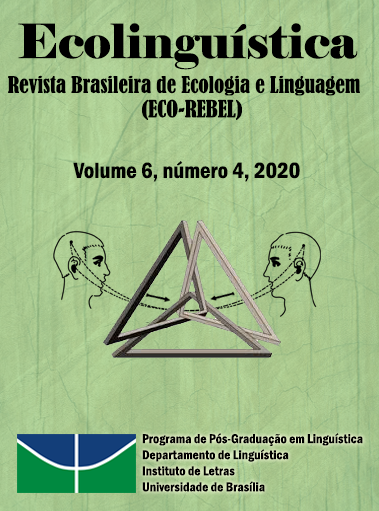Pandemic possibilities for applied linguists’ actions
Mots-clés :
Linguista aplicado; pandemia zoonótica; objetivos do desenvolvimento sustentável; antropoceno; educação ambiental; reducitarianismo.Résumé
Este artigo desafia linguistas aplicados e outros acadêmicos a pensar e agir fora de sua torre de marfim para ajudar a sociedade a enfrentar a COVID-19, pandemias futuras e outras crises que os humanos e outros terráqueos enfrentam atualmente e que já estão no horizonte. Essas ações podem envolver não apenas a pesquisa que fazemos mas também as maneiras pelas quais compartilhamos nosso trabalho e como ensinamos aos nossos estudantes. Nove exemplos de tais situações são apresentados e os leitores são convidados a colaborar nesse importante trabalho.
Téléchargements
Références
ADAMS, C. J.; BREITMAN, P.; MESSINA, V. Even vegans die. Lantern, 2017.
CARRINGTON, D. Earth’s sixth mass extinction event already underway, scientists warn. The Guardian. 2017, July 10.
CARRINGTON, D. Why you should go animal-free. The Guardian. 2020, June 19.
CHAU, M. H.; JACOBS, G. M. (manuscript submitted for publication). Controversy in language guidelines and practices.
CHAU, M. H.; ZHU, C. H.; JACOBS, G. M.; DELANTE, N.; ASMI, A.; HUANG, L.-F.; NG, S.; JOHN, S. S.; GUO, Q; MAN, D.; SHUNMUGAM, K. (manuscript submitted for publication). Applied linguistics and the sustainable development goals: the case of media attention to basic human needs and covid-19.
DE WAAL, F. Are we smart enough to know how smart other animals are? W.W. Norton, 2016.
Fairclough, N. Critical discourse analysis: The critical study of language (2nd ed.). Routledge, 2013.
GILQUIN, G., & JACOBS, G. M. (2006). Elephants who marry mice are very unusual: The use of the relative pronoun who with nonhuman animals. Society & Animals v. 14, n. 1, 2006, p. 79-105.
https://www.animalsandsociety.org/wp-content/uploads/2016/04/gilquin.pdf
GREGER, M. (2020). How to survive a pandemic. Bluebird. IBÁÑEZ, M. B.; GARCÃA RUEDA, J. J.; MAROTO, D.; & KLOOS, C. D. (2013). Collaborative learning in multi-user virtual environments. Journal of Network and Computer Applications v. 36, n. 6, 2013, p. 1566-1576.
JACOBS, G. M. [Review of the book Are we smart enough to know how smart animals are? by Frans de Waal 2017], 2017a. Retrieved from
https://www.facebook.com/humananimalstudiesnewzealand/posts/1411583718880939 JACOBS, G. M. [Review of the book Even vegans die, by C. J. Adams, P. Breitman, & V. Messina]. [blog post], 2017b, June 6. Retrieved from http://animalallies.sg/blog/
JACOBS, G. M. How to be an engaged intellectual. Journal of Modern Languages, 29, 2019, p. 126-146. https://doi.org/10.22452/jml.vol29no1.6
JACOBS, G. M., & DILLON, D. Promoting critical literacy: The case of promotional materials for burgers. ECO-REBEL, v. 5, n. 1, 2019, p. 16-27.
JACOBS, G. M.; FONG, S. J. (2020). Perspectives on a 2019 tiger-human interaction incident in Malaysia. ECO-REBEL V. 6, N. 1, 2020, P. 41-51. Retrieved from https://periodicos.unb.br/index.php/erbel/article/view/29896
JACOBS, G. M.; Goatly, A. Ecological issues in ELT coursebooks. ELT Journal 54, 2000, p. 256-264.
JACOBS, G. M.; GRELICHE, N. (2017). Convincing students that their groupmates’ success can increase, not diminish, their own success. Insight: A Journal of Scholarly Teaching, 12, 2017, p. 145-157. JACOBS, G. M., JOYCE, M. J.; SUBRAMANIAM, J. The presence of food in English as an additional language textbooks. (ERIC Document Reproduction Service No. ED ED585231), 2018. https://files.eric.ed.gov/fulltext/ED585231.pdf JACOBS, G. M; G. M., KIMURA, H.; GRELICHE, N. (2016). Incivility among group mates in English classes at a Japanese women’s university. TESL-EJ, v. 19, n. 4, 2016, p. 1-16. http://www.tesl-ej.org/pdf/ej76/a6.pdf
JACOBS, G. M.; LEWIS, P. Commentary: Add more plants, and less meat to your meals. Here’s why. Channel News Asia, 20128, November 25.
JACOBS, G. M.; TAN, H. S.; TEH, J. X. (2018). The acceptance of virtual presentations at International conferences on education. ECO-REBEL v. 4, n. 2, p. 49-64. Retrieved from https://periodicos.unb.br/index.php/erbel/article/view/12360
JACOBS, G. M.; TEH, J. X.; JOYCE, M. J. The presentation of animals in English as an additional language coursebooks. Language & Ecology 2016.
https://files.eric.ed.gov/fulltext/ED574076.pdf JOHNSON, D. W.; JOHNSON, R. T.; STANNE, M. B. Cooperative learning methods: A meta-analysis. University of Minnesota, 2000.
Klöckner, C. A. The psychology of pro-environmental communication: Beyond standard information strategies. Palgrave, 2015.
LIE, A.; JACOBS, G. M.; AMY, S. (Eds.). English via environmental education. Grasindo. National Geographic. (2020). 2002. Anthropocene.
https://www.nationalgeographic.org/encyclopedia/anthropocene/
NPR. UN warns number of people starving to death could double amid pandemic. (2020, May 5).
SHAPIRO, P. (2018). Clean meat: How growing meat without animals will revolutionize dinner and the world. Simon & Schuster.
Slavin, R. Synthesis of research on cooperative learning. Educational Leadership v. 48, n. 5, 1991, p. 71-82.
STIBBE, A. Ecolinguistics: Language, ecology, and the stories we live by. Routledge, 2015.
UNESCO”“UNEP. (1976). The Belgrade Charter: A global framework for environmental education. Connect, v. 1 n. 1, 1976, p. 1”“9.
United Nations. (2020). Sustainable development goals. 2020.
https://www.un.org/sustainabledevelopment/sustainable-development-goals/
VAN RYZIN, M. J.; ROSETH, C. J.; BIGLAN, A. Mediators of effects of cooperative learning on prosocial behavior in middle school. International Journal of Applied Positive Psychology v. 5, 2020, p. 37-52.
WORLDOMETER. COVID-19 coronavirus pandemic. (2020, November 1).
Téléchargements
Publié-e
Comment citer
Numéro
Rubrique
Licence
(c) Tous droits réservés Ecolinguística: Revista brasileira de ecologia e linguagem (ECO-REBEL) 2020

Cette œuvre est sous licence Creative Commons Attribution - Pas d'Utilisation Commerciale - Pas de Modification 4.0 International.
Autores que publicam nesta revista concordam com os seguintes termos:
Autores mantêm os direitos autorais e concedem à revista o direito de primeira publicação, sendo o trabalho simultaneamente licenciado sob a Creative Commons Attribution License o que permite o compartilhamento do trabalho com reconhecimento da autoria do trabalho e publicação inicial nesta revista.
Autores têm autorização para assumir contratos adicionais separadamente, para distribuição não exclusiva da versão do trabalho publicada nesta revista (ex.: publicar em repositório institucional ou como capítulo de livro), com reconhecimento de autoria e publicação inicial nesta revista.
Autores têm permissão e são estimulados a publicar e distribuir seu trabalho online (ex.: em repositórios institucionais ou na sua página pessoal) a qualquer ponto antes ou durante o processo editorial, já que isso pode gerar alterações produtivas, bem como aumentar o impacto e a citação do trabalho publicado (Veja O Efeito do Acesso Livre).



3.png)



